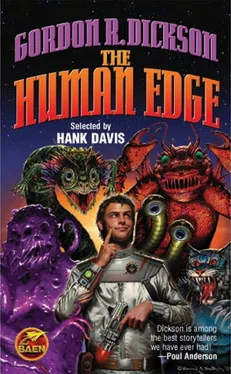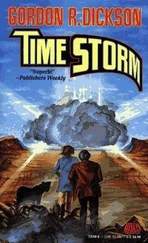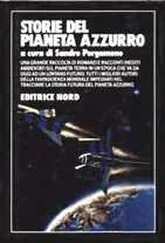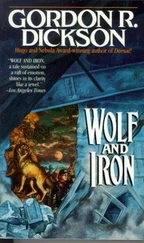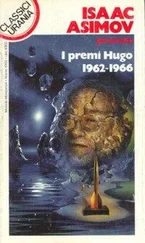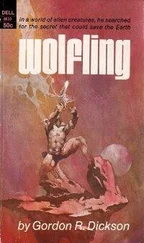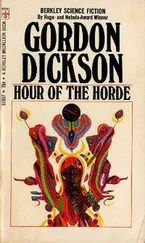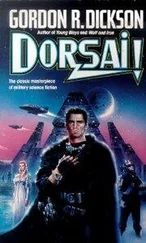The metal creaked and bent, dipping downward toward the acid, but Eldridge was already swinging onward under the powerful impetus of his arms from which the sleeves had fallen back to reveal bulging ropes of smooth, powerful muscle. He flew forward through the air, feet first, and his boots took the nearest guard in the face, so that they crashed to the ground together.
For a second they rolled entangled, then the guard flopped and Eldridge came up on one knee, holding the black tube of the guard’s weapon. It spat a single tongue of flame and the other guard dropped. Eldridge thrust to his feet, turning to the still-open door.
The door was closing. But the panicked food-carrier, unarmed, had turned to run. A bolt from Eldridge’s weapon took him in the back. He fell forward and the door jammed on his body. Leaping after him, Eldridge squeezed through the remaining opening.
Then he was out under the free sky. The sounds of alarm screechers were splitting the air. He began to run—
The doctor was already drugged—but not so badly that he could not make it to the field when the news came. Driven by a strange perversity of spirit, he went first to the prison to inspect the broken hatch and the bent food arm. He traced Eldridge’s outward path and it led him to the landing field where he found the commander and the academician by a bare, darkened area of concrete. They acknowledged his presence by little bows.
“He took a ship here?” said the doctor.
“He took a ship here,” said the commander.
There was a little silence between them.
“Well,” said the academician, “we have been answered.”
“Have we?” the commander looked at them almost appealingly. “There’s no chance—that it was just chance? No chance that the hatch just happened to fail—and he acted without thinking, and was lucky?”
The doctor shook his head. He felt a little dizzy and unnatural from the drug, but the ordinary processes of his thinking were unimpaired.
“The hinges of the hatch,” he said, “were rotten—eaten away by acid.”
“Acid?” the commander stared at him. “Where would he get acid?”
“From his own digestive processes—regurgitated and spat directly into the hinges. He secreted hydrochloric acid among other things. Not too powerful—but over a period of time—”
“Still—” said the commander, desperately, “I think it must have been more luck than otherwise.”
“Can you believe that?” asked the academician. “Consider the timing of it all, the choosing of a moment when the food arm was in the proper position, the door open at the proper angle, the guard in a vulnerable situation. Consider his unhesitating and sure use of a weapon—which could only be the fruits of hours of observation, his choice of a moment when a fully supplied ship, its drive unit not yet cooled down, was waiting for him on the field. No,” he shook his woolly head, “we have been answered. We put him in an escape-proof prison and he escaped.”
“But none of this was possible!” cried the commander.
The doctor laughed, a fuzzy, drug-blurred laugh. He opened his mouth but the academician was before him.
“It’s not what he did,” said the academician, “but the fact that he did it. No member of another culture that we know would have even entertained the possibility in their minds. Don’t you see—he disregarded, he denied the fact that escape was impossible. That is what makes his kind so fearful, so dangerous. The fact that something is impossible presents no barrier to their seeking minds. That, alone, places them above us on a plane we can never reach.”
“But it’s a false premise!” protested the commander. “They cannot contravene natural laws. They are still bound by the physical order of the universe.”
The doctor laughed again. His laugh had a wild quality. The commander looked at him.
“You’re drugged,” he said.
“Yes,” choked the doctor. “And I’ll be more drugged. I toast the end of our race, our culture, and our order.”
“Hysteria!” said the commander.
“Hysteria?” echoed the doctor. “No— guilt! Didn’t we do it, we three? The legend told us not to touch them, not to set a spark to the explosive mixture of their kind. And we went ahead and did it, you, and you, and I. And now we’ve sent forth an enemy—safely into the safe hiding place of space, in a ship that can take him across the galaxy, supplied with food to keep him for years, rebuilt into a body that will not die, with star charts and all the keys to understand our culture and locate his home again, using the ability to learn we have encouraged in him.”
“I say,” said the commander, doggedly, “he is not that dangerous—yet. So far he has done nothing one of us could not do, had we entertained the notion. He’s shown nothing, nothing supernormal.”
“Hasn’t he?” said the doctor thickly. “What about the defensive screen—our most dangerous most terrible weapon—that could burn him to nothingness if he touched it?”
The commander stared at him.
“But—” said the commander. “The screen was shut off, of course, to let the food carrier out, at the same time the door was opened. I assumed—”
“I checked,” said the doctor, his eyes burning on the commander. “They turned it on again before he could get out.”
“But he did get out! You don’t mean…” the commander’s voice faltered and dropped. The three stood caught in a sudden silence like stone. Slowly, as if drawn by strings controlled by an invisible hand, they turned as one to stare up into the empty sky and space beyond.
“You mean—” the commander’s voice tried again, and died.
“Exactly!” whispered the doctor.
* * *
Halfway across the galaxy, a child of a sensitive race cried out in its sleep and clutched at its mother. “I had a bad dream,” it whimpered.
“Hush,” said its mother. “Hush.” But she lay still, staring at the ceiling. She, too, had dreamed.
* * *
Somewhere, Eldridge was smiling at the stars.
From the serious to the not-so. The rough, tough alien, a very unsympathetic one this time, obviously comes from a planet with no equivalent of poker. This is one of a handful of stories Dickson wrote about the somewhat wacky adventures of Hank Shallo, and the title “Sleight of Wit” could have applied to any and all of them. I wish he had stuck around longer, not only to finish his Childe Cycle, but also because he might have let Mr. Shallo do still more interstellar trouble-shooting. And not just because one seldom runs across a hero named Hank….
It was a good world. It was a very good world—well worth a Class A bonus. Hank Shallo wiped his lips with the back of one square, hairy, big-knuckled hand, put his coffee cup down, and threw his ship into orbit around the place. The orbit had a slight drift to it because the gyros needed overhauling; but Hank was used to their anomalies, as he was to the fact that the coffee maker had to be set lower on the thermostat than its directions called for. He made automatic course corrections while he looked the planet over for a place to sit down.
Hank was a world scout—an interstellar pioneer far-flung in his fleet one-man spacecraft in search of new homes for humanity. He had been picked to model as such for a government publicity release the last time he had been back to Earth. The picture that resulted, in three-dimensional full-color, showed Hank barrel-chested in a fitted blue uniform, carelessly open at the throat, seated at the gleaming controls of a scout cabin mock-up. Utilitarianly tidy, the little cabin surrounded him, from the folded up Pullman-type bunk to the arms rack with well-oiled weapons gleaming on their hooks. A battered guitar leaned in one corner.
Читать дальше
